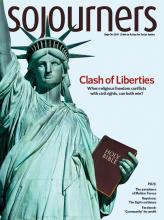MANY OF THE VOICES in this month’s readings seem to have “no filter.” They say what they think without adjusting it for politeness or theological correctness. In so doing, biblical paragons are presented as identifiably human, and God is seen as a God who welcomes our unvarnished truth. Here the raw human emotion acknowledges the complex terrain that is the human heart. The texts assume we feel, hurt, and occasionally want revenge; that we transgress and fear revenge; that we want forgiveness for ourselves but not necessarily for others. We can feel that God had gotten the better of us. Our experiences of God can be frustrating and painful. Like Jeremiah and Jonah here and Hagar (Genesis 16:7-14; 21:15-19) and Hannah (1 Samuel 1:9-11) elsewhere, these texts invite us to tell God about God and take our frustrations to God.
The scriptures call us to interpret them with regard to their ancient contexts and our contemporary ones. Israel/Judah, in any of its configurations, was one of the smallest and least powerful nations in its world. The scriptures were compiled and received their last edit when what was left of Israel was completely subjugated by a foreign power. That is not our contemporary situation as Americans. We may have been conditioned to read from the position of Israel, but we also need to read from the position of empires that subjugate. If God can bear us without filters, surely we can scrutinize our own imperial impulses.
Read the Full Article

